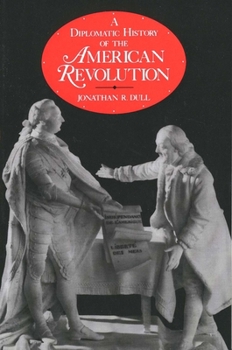A Diplomatic History of the American Revolution
Select Format
Select Condition 
Book Overview
This introduction to the diplomacy of the American Revolution presents a fresh, realistic, and balanced portrait of revolutionary diplomats and diplomacy. This description may be from another edition of this product.
Format:Paperback
Language:English
ISBN:0300038860
ISBN13:9780300038866
Release Date:September 1987
Publisher:Yale University Press
Length:236 Pages
Weight:0.40 lbs.
Dimensions:0.6" x 6.0" x 9.0"
Customer Reviews
3 ratings
Did Britain "win" the Revolutionary War?
Published by Thriftbooks.com User , 14 years ago
In his work A Diplomatic History of the American Revolution, Jonathan R. Dull attempts to present the reader with what he terms a new synthesis of Revolutionary diplomacy. He proposes to do this by debunking traditionally accepted perceptions "such as the `idealism' of American diplomats or the significance of the Battle of Saratoga."1 Dull intends to develop this new synthesis by "paying attention to all the participants in the War for American Independence (the United States, Great Britain, France, Spain, and the Netherlands) and even to that of some of the onlookers, such as Russia."2 Given the extent of his task, Dull succeeds in identifying numerous factors and contributors, both foreign and domestic, which shaped American diplomacy from its very beginnings. He also manages to achieve his objective "to avoid the all-too-human tendency to believe ourselves the central point about which the world revolves."3 Dull is certainly credible; he wrote several other books, including Franklin the Diplomat: The French Mission, and The French Navy and American Independence: A Study of Arms and Diplomacy, 1774-1787, and was associate editor for The Papers of Benjamin Franklin, which he references frequently. Early in this work, he describes the "Committee of Secret Correspondence" appointed by the Continental Congress to "correspond with `our friends' in Britain and elsewhere," and identifies Arthur Lee, Silas Deane, and Benjamin Franklin as the first official American diplomats.4 He goes on to portray the estrangement of the colonies from Mother England as the precursor to the Revolution. In describing the global politics of Europe during the pre-Revolutionary era, he makes it clear that the British were unusual with regard to their colonial possessions in North America. They "viewed their colonies in North America as an integral part of an interconnected empire."5 Because of this paternalistic view, the British sent a large army to North America, which caused the French to abandon Canada, leaving them a large army in place with no mission and transforming America into an object of diplomacy. With this backdrop in place, he continues to expound on his thesis that a myriad of factors, many not commonly recognized, influenced the development of diplomacy during the Revolution. He delves into the European "Balance of Power"6 theory that attempts to explain how states conduct their foreign affairs, and how even countries without "great power" status have international influence, though not on so grand a scale as the major players. He traces diplomatic origins of the Revolution to the failure of British diplomacy after the Seven Year's War and to French foreign policy during the reign of Louis XV. He gauges the British reaction to the Revolution and traces the development of an independent American diplomacy. He explains the French offer of secret aid to the Americans early in the conflict, and the Revolution's less than overwhelming impact i
Good Overview, But Dry as Parchment
Published by Thriftbooks.com User , 17 years ago
"A Diplomatic History of the American Revolution" is a succinct but lifeless chronicle of the diplomatic maneuvering around the American Revolution. The book's great virtue is the way it situates the Revolution in the context of European balance of power politics -- it stresses the important (yet often forgotten) point that the Revolution was only one front in a global war between Great Britain and France, Spain, and the Netherlands. Unfortunately, the book is also dry as dust. The author makes no attempt to enliven his material with biographical anecdotes, cultural observations, or wit. He also makes no attempt to analyze broader political, economic, or ideological trends. The upshot: the book would make an excellent college text, but few general readers would enjoy it. Too bad.
A Good Summary of Revolutionary Era Diplomacy
Published by Thriftbooks.com User , 21 years ago
This is a nice summary of the diplomacy that occurred before and during the Revolutionary War, which occurred within a larger context involving the European powers, particularly England and France. The story itself is interesting, involving personalities such as Benjamin Franklin and John Adams. The book presumes a fair degree of prior knowledge about the American Revolution. This should not be (nor is it likely to be) the first book you read on the Revolution. That said, this is a good single-volume summary of an important and frequently neglected aspect of the Revolution.





